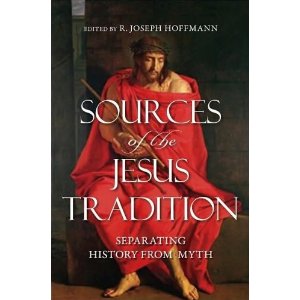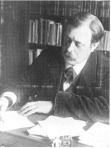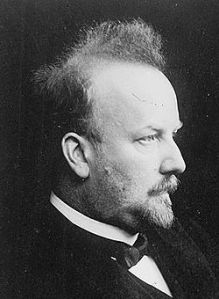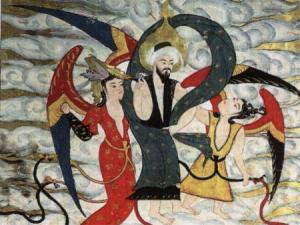I have come to the following conclusion: Scholarship devoted to the question of the historicity of Jesus, while not a total waste of time, could be better spent gardening.
In this essay, however, I will focus on why it is not a total waste of time.
What seemed to be an endlessly fascinating question in the nineteenth century among a few Dutch and German radical theologians (given a splash of new life by re-discoverers of the radical tradition, such as G A Wells, in the twentieth) now bears the scent and traces of Victorian wallpaper.
Theologians in the “mainstream academic tradition” have always been reluctant to touch the subject because, after all, seminaries do not exist, nor for that matter departments of religious studies, to teach courses in the Christ Myth. For that reason, if the topic is given syllabus space at all it is given insufficient space and treated as the opposite of where sober, objective scholarly inquiry will take you in New Testament studies.
It sometimes, but not often or generally enough, occurs to my colleagues that much of what passes for real scholarship is equally slipshod, constructed on equivalently shaky and speculative premises and serviced by theories so artificial (Q, for example) that (to quote myself in the introduction to George Wells’s The Jesus Legend) it can make the theory that Jesus never existed a welcome relief from the noise of new ideas.
I umpired what was (as far as I know) the only direct conversation between George Wells and Morton Smith (Jesus the Magician, 1978) in 1985, in Ann Arbor Michigan. On that occasion, Smith said naughtily that “the only thing Professor Wells and I have in common is that we each hold a theory that the other regards as absurd.” So much for “real templates.” Especially ones that ask us to accept that “everything we have previously learned is wrong.” Not even the Novum Organum asks us to believe in that kind of paradigm shift. As for myself, the only thing I have in common with both those who want to argue the myth theory as a provable hypothesis and those who believe the gospels provide good evidence for the life of Jesus is that we are probably all wrong.
I accept that most of what we have learned about Jesus is “wrong” in one sense or another. Almost all of what the churches have taught about him–the christology that undergirds the doctrines of the Christian traditions, for example–is wrong at a literal level. It has to be because it is based on doctrines derived from a naive supernaturalist reading of sacred texts whose critical assessment had not even been contemplated before the eighteenth century.
But so too, the critical assessment is wrong, because it has been motivated by a belief that by removing the husks of dogmatic accretion–a process initiated by Luther’s liberal scholastic predecessors, in fact–a level of actuality would eventually be reached. There would be an assured minimum of truth (often assumed by the end of the 19th century to be primarily ethical rather than Christological, as doctrines like ascension and virgin birth were sent to the attic) which some historians on both the Catholic modernist and Protestant side thought would be unassailable.
It never happened of course, and the great conclusion to the whole enterprise after notable false stops in the twentieth century was the Jesus Seminar. It was never clear to me how a methodology with its roots tangled in a kind of cloddish German academic hubris (husk, husk, husk, sort and sift) could come to a salutary end. And it didn’t, unless we can assume that giving birth to a Jesus who said nothing for certain and might have said anything at all is a “result.”
I admit to being a bit prickly on the subject, having finally concluded that the sources we possess do not establish the conditions for a verdict on the historicity of Jesus. Some of my reasons for saying so are laid out in a series of essays included in the anthology Sources of the Jesus Tradition, coming out in August. The main argument for Jesus-agnosticism is being developed in a more ambitious study, The Jesus Prospect, for which watch this and other spaces. (The prologue on method will be ready later in 2010.)
But before all of that, let me say a few words about why I believe Christianity benefits from discussions like this, and especially from Jesus-agnosticism (as opposed to Jesus-loving and Jesus-denying scholarship)–without ever having formally to acknowledge them.
For just over four years of my academic life I have taught in predominantly Muslim universities. Both were highly selective places, the sort of institutions contrived to train “tomorrow’s leaders,” highly aware and critical of the dangers of madrasah education, more than willing to make judicious room for the comparative study of religion. But secular approaches to the Quran were not high on the agenda of either place. Even in “liberal” circles in the Islamic world there is an enclosure for religion which is to be treated respectfully, or ignored, but not questioned extensively.
The question of the historicity of Jesus does not arise naturally in Islam–or I should say among believers–any more than the “question” of Muhammad naturally arises. The status of Jesus in Islam is assured not because he is the star of the New Testament but because as Issa he is a a revered figure in Islam. He is not the unique prophet. He is not the way, truth and life. People do not “get” to Allah through him. But he is sui generis. That is, he is an indispensable rung in a ladder that leads to God through the Prophet who is unique: Muhammad.
Myth-theorists, to the extent they pay attention to other religions, tend to regard Muslim belief with the same defensive disdain one often associates with Christian fundamentalists’ view of Islam: Islam is later, derivative, probably bogus (they reason); Muslim rejection of what the prior tradition specifies about Jesus, fatally injures their own contingent tradition. –As Jesus goes, so goes Muhammad. Revelation is whole cloth, not patchwork, and it is often more annoying than interesting to Christians (and some secularists) that Islam seems to be a sequel to the Bible with a slightly revised cast of characters and substantially revised course of events.
Needless (I hope) to comment that western views of the sort described above are ignorant. Jesus’ “role” in Muslim teaching does not depend on any Christian beliefs about Jesus but on the Quranic incorporation of Jesus. The status of Jesus in Islam is contingent on Islam, not Christian teaching about Jesus. Muhammad ur-rasul Allah: The Prophet is the seal (guarantor) of the prophets and at the absolute center of a religious cosmos–which nevertheless includes satellites like Jesus, David, and Abraham in orbit around him.
“Say, ‘I am only a man like yourselves; (but) I have received the revelation that your God is only One God. So let him,
who hopes to meet his Lord, do good deeds, and let him join
no one in the worship of his Lord!’ [Surah Al-Kahf 18 :lll).
Interestingly, however, this apparent protest of humility actually enhances the prophet’s stature. He’s an earthen vessel, but all the more credible because he bears human testimony to the miraculous and to the reality of a personal encounter with the divine will. More than the scholars of Islam, the sufis and mystics would preserve this belief.
To the extent this encounter is reflected in prior religious traditions, Muhammad is more a prophet like Moses on Sinai than a water-walking miracle-worker like Jesus. Maybe this signals a continuity of desert tradition largely missing in the artifice of Christianity, but the Quran is far more Torah than Gospel. The directness of the dialogue between Allah and the Recorder, Muhammad himself, is the directness of the instructions of Yahweh to Moses. True, in Islamic tradition Muhammad is sometimes credited with miracles, like splitting the moon (a gloss of Surah 54.1-2). But “orthodox” Islam in its sectarian complexity does not tie itself to these supernatural occurrences: the final miracle of Islam is the Quran itself and the place of Muhammad in its promulgation. What he said, did, and taught (and there are plenty of hadith projects in departments of Islamic theology devoted to just that question) are of secondary consequence. It is vital that he existed because without that the divine will would never have been known in an authentic form and the correction of existing inauthentic forms, like the biblical tradition, would never have taken place.
Odd, then, that the historicity of Jesus should be of any concern at all in relation to a person whose humanity, in the letters of Paul and in the gospels (to a lesser extent, perhaps) is of no consequence to the core tradition. The battle of the post-New Testament period in the early Church, as Harnack recognized, was not to define the divinity of Jesus but to defend his humanity.
What’s usually missed in the discussion of the war between right and wrong believers before 325 is that both camps agreed on the essentials: whatever else Jesus was, “human” doesn’t do justice to it. The bitterness of battle, and the cheer-leading that has gone on for the victors ever since, leads us away from the fact that even the pro-humanity orthodox camp did not leave us with an historical figure but with a luminescent god-man whose finger perpetually points to his own breast as the source and explanation for his mission to earth.
Mission to earth? Yesterday’s gnosticism is today’s science fiction. It is all too easy to fall into gnosticism or science fiction when we examine such images in the writings, art, and liturgy of the church. Especially if we also see religion, more generally, as a species of superstition–resurrections and ascensions into heaven as undiagnosed instances of mass obsessional disorder.
But to discover elements of the fantastic in religions like Christianity and Islam, vestiges of thought-processes that fail our requirements for modernity, is not the same as “demonstrating” that religion is fantasy.
Love, fear, joy, pleasure, mother-love, and compassion equally have their origins in emotion and human evolution and are nonetheless “real” in daily life–indeed, shape daily life–constantly expressing themselves in thought and action. Religion consolidates these aspects of existence in a way that simple curiosity and information does not. It roots them not in the self but in something external, like God, or incarnates them in messengers like Jesus and metaphors like sin, forgiveness and redemption. That is what is going on in the New Testament, not an episode of To Tell the Truth.
For this reason–starting with a certain lack of profundity—it is difficult not to find the musings of (many) myth-theorists frankly ridiculous. The early church found the historical Jesus all but unnecessary: that is the story. They found his humanity necessary as a theological premise, because they could not quite grasp the concept of disembodied divinity. Besides, a god without humanity could scarcely be expected to comprehend human suffering, or desire to do anything about it. History did not require Jesus; emotion did. It required as well the incredible and fantastic aspects of his personality. History required Muhammad and the non-divinity of Muhammad for other reasons. That is why the two traditions are different.
I say could not “quite grasp” the idea of a disincarnated divinity because some of the Christian fathers flirted with Neoplatonism–Clement of Alexandria, for example–and they were saved by a pragmatic hair from being gnostics themselves, as I think–if we are being honest and not pedantic–the author of the Gospel of John was.
The writer’s tortured theological prologue is our best evidence of the philosophical dilemma confronting some early christian communities.
But the true (non-Christian) Neoplatonists like Porphyry despised Christianity because, they said, a disembodied divinity is the only form divinity takes. To reach the far-distant god of a Plotinus you need not just a little water, a few words to a confessor and a healthy appreciation for the Eucharist but a very big invisible ladder and the annihilation of all fleshly encumbrances.
Stuck with the Bible, the gospel, a growing body of doctrine, necessitated by struggles with heretics, and the religious demands of a growing community–a lot of weight to carry–Christianity could not very easily take the turn toward disembodied and denatured divinity. If, for the pagans, the resurrection of the flesh was a nauseating idea, for the Christians it became a useful absurdity and the prelude to two millennia of “paradoxical” theology. The earliest shapers of Islamic thought were scarcely seduced by ingenious verbal strategies for mixing and mingling the human and divine: Muhammad therefore stayed vigorously human.
If, as I think, the church was largely successful in subduing the humanity of Jesus while insisting as a strictly dogmatic matter that he was both fully human and fully divine (historical and unhistorical, as in John 1.1-15?), why still bother to ask about whether he “really” existed. Shouldn’t the question really be who or what existed? It is not the same as asking whether Muhammad existed since nothing but one kind of reality has ever been claimed for him, and that is historical.
My defense of debates and discussion of the historical Jesus is not based on any confidence that something new is going to be discovered, or some persuasive “template” found that will decide for us a question that the early Christian obviously regarded as irrelevant. Still less is it based on some notion that the Church will retract the doctrine of the trinity or the hypostatic union, clearing the way for an impartial investigation into the life of Jesus. That is already possible, and as always before the journey gets us to the front door of the Church. Nothing has been more depressing than the search for the Jesus of history, and nothing more hollow than the shouts of scholars who have claimed to find him. Except the shouts of scholars who claim there is nothing to find.
Not that the shapers of the Jesus tradition, whatever their real names were, should have the final say, but they did draw the map and bury the treasure. We are the victims of their indifference to the question.
The really good news is that to the extent we don’t know who Jesus was or even whether he was, Christianity is spared the awful theological and religious certitude that drives Islam to do sometimes outrageous and violent things in defense of that certainty, the totalizing imperative that all religions in their history have struggled to keep in the cave.
The incredibility of the divine and the uncertainty of the human is a potent defense against a totalizing imperative, an inadvertent safeguard created by the extravagance of early doctrine. The vulnerability of Christianity is a vulnerability created by critical examination of its sacred writings–the legacy of its scholars, including its religious scholars, its secular scholars, and even scholars whose speculation outruns caution and evidence. It was Christian scholarship that first put Christianity at risk. Islamic scholarship has played no equivalent role in relation to Islam.
In the end, Jesus and Muhammad are more unalike than alike. If both are unique, they are unique in different ways and not because either’s claim to invulnerable authority can be treated as true or false on the basis of evidence.
Because of accidental but real historical circumstances, inquiry has invulnerated the Christian tradition in a way that has yet to happen, and may never happen, in Islam. If it does happen, it will not be because the west compels it, or because science requires it or because secularism requires it. Islam is not in retreat from the forces of reason. It will certainly not happen because some absurd theorists, mainly western, under-informed and under-equipped, and working on western assumptions, claim that (like Jesus?) Muhammad never existed.
But that is a subject for another time…




















